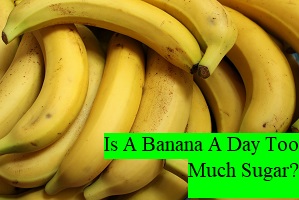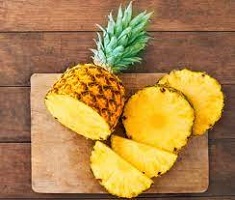Is A Banana A Day Too Much Sugar? True or False
Is A Banana A Day Too Much Sugar? True or False
FALSE

A banana a day is not a lot of sugar. There are two types of sugar: natural and refined, and bananas are a good source of carbohydrates because they contain fructose (a naturally occurring sugar).
Natural sugars also provide energy to the body and other important nutrients necessary for good health, such as fiber, potassium, and B vitamins.
Is A Banana A Day Too Much Sugar? False:
Bananas have too much sugar – False!
A medium-sized banana contains approximately 14 grams of sugar, which accounts for approximately 53% of its total 105 calories.
When you consider that a banana is a half sugar, it’s easy to see why some people believe they should avoid them.
The sugars that certain health professionals recommend cutting back on are added sugars. These are sugars that are both unnatural and highly refined.
Natural Sugar vs. Refined Sugar
Here’s how natural sugar differs from refined sugar.
- Natural Sugar;
These sugars occur naturally in fruit (fructose), vegetables, grains, and dairy products, as the name implies (lactose).
Because these foods contain fiber and protein, natural sugars are digested and absorbed into the bloodstream at a slower rate, providing a steady supply of energy to your cells.
They also contain vitamins, minerals, and antioxidants, which are required for energy metabolism, immune function, cell health, and other functions.
A diet high in fruits and vegetables can also help lower the risk of chronic diseases like diabetes, heart disease, and some cancers.
- Refined Sugars;
This sugar is made from sugar cane or sugar beets and is commonly found as sucrose (a combination of glucose and fructose).
In contrast to naturally occurring sugars in whole foods, which are usually paired with fiber and/or protein, your body quickly breaks down refined sugars, causing insulin and blood sugar levels to spike.
Furthermore, refined sugars provide a lot of calories but provide little nutritional value.
High-sugar diets can increase your risk of diabetes, obesity, heart disease, cancer, and cognitive decline.
What is the sugar content of a banana? How much sugar is in a banana?
The sugars in the banana, on the other hand, are all naturally occurring (fructose, glucose, sucrose, and maltose)
A medium banana (about 126 grams) has 29 grams of carbohydrates and 112 calories. Carbohydrates come in the form of sugar, starch, and fiber
A medium banana has approximately 15 grams of sugar.
Should I stop eating bananas because they are high in sugar? Is A Banana A Day Too Much Sugar?
Sugar in Bananas
14 grams of sugar are contained in a medium banana, which measures 7 to 7 7/8 inches long and weighs 118 grams.
This accounts for approximately 53% of its total 105 calories. The sugar in bananas is mostly naturally occurring fructose, but it also contains glucose, sucrose, and maltose.
How Many Bananas Should You Eat per Day? Is A Banana A Day Too Much Sugar?
The best way to get the most out of bananas is to eat them in moderation. Most healthy people can probably get away with one to two bananas per day.
Make your diet more balanced by including other foods that provide nutrients that bananas do not.
Is banana good for weight loss?
Bananas help you lose weight because they contain fiber, which slows digestion and keeps you full.
According to research, increasing fiber intake can reduce the risk of weight gain by up to 30%. Eat up to one banana per day as part of a healthy weight-loss diet.
The Effects of Bananas on Diabetes and Blood Sugar Levels
Bananas do contain simple carbohydrates, which can raise blood sugar levels more than other nutrients.
Bananas contain fiber in addition to sugar and starch. This means that the sugars in bananas are digested and absorbed more slowly, potentially preventing blood sugar spikes.
Portion control ~ the size of the banana you eat affects your blood sugar level. The larger the banana, the more carbohydrates you’ll consume and the higher your blood sugar will rise.
Banana Benefits ~ Bananas are high in nutrients.
Bananas are perhaps best known for their potassium content, with a large banana containing approximately 490 mg of this electrolyte – a mineral that becomes electrically charged in your bloodstream and that governs heart rate and nerve and muscle function.
To keep fluid levels balanced, the body carefully maintains potassium and sodium (another electrolyte) levels.
Nutritional Benefits of Banana ~ Is A Banana A Day Too Much Sugar?
Banana sugar comes with a high nutritional value. One medium banana contains more than 3 grams of fiber, which accounts for 10% of the daily recommended value for a 2,000-calorie diet. Fiber aids digestion and has the potential to lower cholesterol.
A medium banana also contains 10 milligrams of vitamin C, an antioxidant important for tissue repair and immunity, as well as vitamin B6, which is essential for energy production and metabolism, and folate, which is important for healthy blood cells and the prevention of neural tube defects in a growing fetus.
A versatile package
Bananas are most commonly consumed raw as a snack, but there are a surprising number of other ways to consume them.
They can be juiced, blended into a smoothie, dehydrated into a chip, and even ground into flour. Bananas can be frozen and puréed into an ice cream-like frozen dessert.
Are Bananas Bad for Your Health? 3 Myths Busted
Myth #1: A banana, like a candy bar, contains far too much sugar.
The average medium banana contains 14 grams of sugar, which is not insignificant. In addition, one ounce of dark chocolate contains 14 grams of sugar.
The difference is that the sugar in a banana is entirely natural, whereas the sugar in chocolate is entirely artificial.
Myth #2: Bananas Make You Fat
A banana has about 100 calories and less than half a gram of fat.
It’s true that excess sugar can be stored as fat when digested and absorbed, but if you eat when you’re hungry and don’t overeat, this won’t happen from a 100-calorie banana.
Myth #3: If I Want to Eat Fruit, Bananas Are Not a Good Option.
I’m not sure why bananas get a bad rap in the fruit world. Their statistics are very similar to those of many other popular fruits.
A medium apple, for example, has about 100 calories and less than 0.5 grams of fat, similar to a banana. The apple also has 19 grams of sugar and less protein than the banana.
In addition, one cup of seedless grapes contains 23 grams of sugar, as well as less fiber and protein than a banana. Furthermore, bananas contain;
17 percent of the daily value of vitamin C, which is essential for strong immunity, youthful skin, and fighting oxidative damage
422 milligrams of potassium, or 12% of the daily value, is important for heart health because it lowers blood pressure, lowers the risk of stroke, and blocks the absorption of dietary cholesterol.
22 percent of the daily value of vitamin B6, a necessary cofactor in the production of the feel-good hormones serotonin and norepinephrine
Is a banana really equivalent to six spoons of sugar? Is A Banana A Day Too Much Sugar?
Here’s what our research says;
When you eat a banana, your body must expend time and energy digesting the complex structure of the banana before it can access carbohydrates.
Before entering your bloodstream, the starchy carbohydrates are broken down into simple sugars.
This distinction explains why bananas have a lower GI rating than table sugar.
Everyone reacts differently to bananas.
It’s important to remember that GI ratings are based on average responses to a specific food.
However, the findings of our PREDICT study show that there is no such thing as an average human: everyone reacts differently to food based on their individual metabolism.
Even if they are identical twins, different people can react differently to the same foods.
Can diabetics consume bananas? Diabetes and bananas
Depending on the size of the fruit, bananas can contain 19-35 grams (g) of carbohydrates per serving, which is an important consideration for diabetics.
How many bananas can a diabetic eat per day?
Most people with diabetes can eat one or two medium-sized bananas per day, depending on how much other fruit they consume.
How much does a banana raise blood sugar?
According to UCSF, bananas have a GL of 12.4, which is considered a medium impact.
As a result, one large banana will affect your blood sugar levels more than foods with a low effect (such as grapefruit).
What is the sugar content of a banana?
12 g
Sugar
What is the sugar content of an apple?
10 g
Sugar
How much sugar in a banana diabetes
A medium banana has approximately 15 grams of sugar.
Bananas do contain simple carbohydrates, which can raise blood sugar levels more than other nutrients.
How many bananas per day is excessive? Is A Banana A Day Too Much Sugar?
“It would be impossible for a healthy person to overdose on bananas,” Collins says.
“You’d probably need 400 bananas per day to reach the potassium levels that would cause your heart to stop beating.
Bananas are not dangerous – in fact, they are and have always been very good for you.
How quickly does a banana raise blood sugar? How much does a banana raise blood sugar?
According to UCSF, bananas have a GL of 12.4, which is considered a medium impact. As a result, one large banana will affect your blood sugar levels more than foods with a low effect (such as grapefruit).
Eating two bananas per day has 8 evidence-based health benefits.
Benefits of Bananas
- Rich in nutrients.
- May improve blood sugar levels
- May support digestive health.
- May aid in weight loss.
- May support heart health.
- Full of antioxidants.
- It may help you feel fuller
- May improve insulin sensitivity when unripe
What Happens To Your Body When You Eat a Banana Every Day?
Bananas are high in vitamins and nutrients, and eating them on a regular basis can help you maintain and improve your overall health. In other words, eating a banana every day is unquestionably the best way to stay healthy.
However, it is important to remember not to overeat bananas on a daily basis. According to Healthline, you should consume one or two bananas per day, but no more than that.
Eating too much of any food, even one as healthy as bananas, can result in weight gain or nutrient deficiencies. When you eat a banana every day, your body will reap numerous benefits.
Do bananas raise your blood sugar? Is A Banana A Day Too Much Sugar?
Bananas contain carbohydrates, which cause blood sugar to rise.
Because carbs raise your blood sugar level more than other nutrients, they can significantly impact your blood sugar management.
When people without diabetes’ blood sugar levels rise, their bodies produce insulin.
Is there a lot of sugar in a banana? Is A Banana A Day Too Much Sugar?
A banana has approximately 23g of carbohydrates, including 2.6g of fiber and 12g of simple sugars.
It would contain 23 g of pure sugar if you measured out the equivalent amount of granulated sugar (about six teaspoons) with 23g of carbohydrates.
What makes bananas unhealthy?

Furthermore, eating too many bananas may result in nutrient deficiencies, particularly if you don’t include foods that contain the nutrients bananas lack, such as protein, fat, calcium, vitamin D, and iron.
Is one banana per day excessive?
For most healthy people, one to two bananas per day is considered a moderate intake. Consume this fruit as part of a well-balanced diet that includes all of the nutrients your body requires.
Is A Banana A Day Too Much Sugar? Here’s the bottom line
Although there are fruits with less sugar than bananas (such as berries, citrus fruits, and melon), bananas are portable, inexpensive, and widely available.
Today I’ll be snacking on a banana… Would you like to join me?


